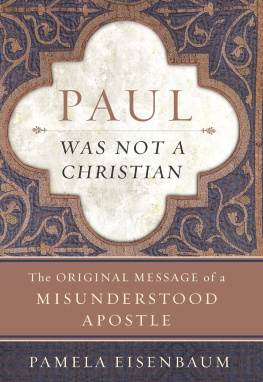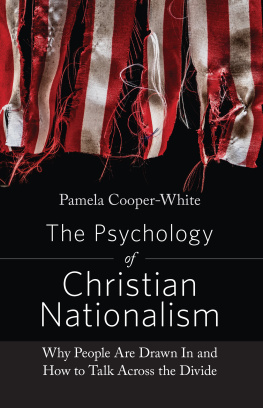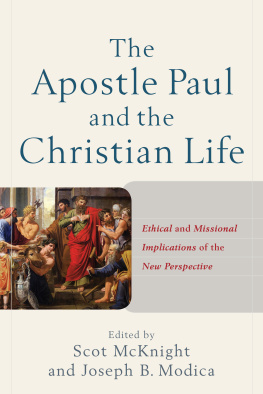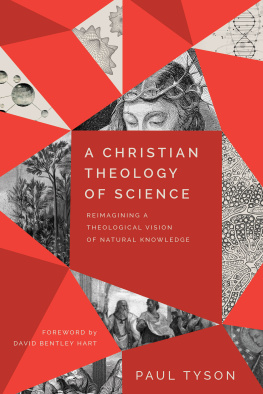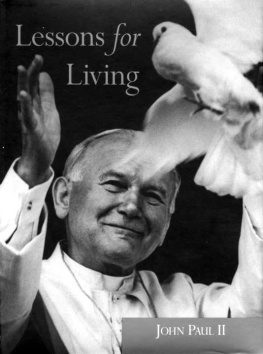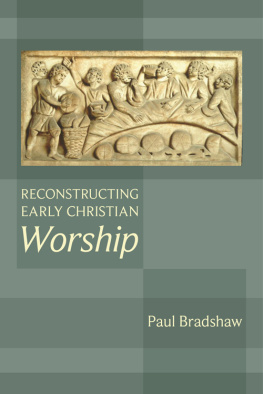Pamela Eisenbaum - Paul Was Not a Christian
Here you can read online Pamela Eisenbaum - Paul Was Not a Christian full text of the book (entire story) in english for free. Download pdf and epub, get meaning, cover and reviews about this ebook. year: 2009, publisher: HarperCollins, genre: Religion. Description of the work, (preface) as well as reviews are available. Best literature library LitArk.com created for fans of good reading and offers a wide selection of genres:
Romance novel
Science fiction
Adventure
Detective
Science
History
Home and family
Prose
Art
Politics
Computer
Non-fiction
Religion
Business
Children
Humor
Choose a favorite category and find really read worthwhile books. Enjoy immersion in the world of imagination, feel the emotions of the characters or learn something new for yourself, make an fascinating discovery.
- Book:Paul Was Not a Christian
- Author:
- Publisher:HarperCollins
- Genre:
- Year:2009
- Rating:3 / 5
- Favourites:Add to favourites
- Your mark:
- 60
- 1
- 2
- 3
- 4
- 5
Paul Was Not a Christian: summary, description and annotation
We offer to read an annotation, description, summary or preface (depends on what the author of the book "Paul Was Not a Christian" wrote himself). If you haven't found the necessary information about the book — write in the comments, we will try to find it.
Paul Was Not a Christian — read online for free the complete book (whole text) full work
Below is the text of the book, divided by pages. System saving the place of the last page read, allows you to conveniently read the book "Paul Was Not a Christian" online for free, without having to search again every time where you left off. Put a bookmark, and you can go to the page where you finished reading at any time.
Font size:
Interval:
Bookmark:
The Original Message of a Misunderstood Apostle

For Mark
I am a firm believer that scholarship is a corporate endeavor, not a solo enterprise. My debt to the scholars who have come before me is enormous, too many for me to name in entirety. But I would be remiss if I did not thank those who have played such a prominent role in helping me develop my thinking on Paul. The reader who looks to the notes at the end of this book will see that I am especially indebted to the work of four scholars: John Gager, Lloyd Gaston, Krister Stendahl, and Stanley Stowers. Without their pioneering work, this work would never have been possible. The same is true of three Jewish scholars who produced important scholarship on Paul: Daniel Boyarin, Mark Nanos, and Alan Segal. Their example inspired me to write this book. I thank all these scholars for their collegiality, support, and dialogue.
This book has taken me a long time to write. Over the years, I have shared parts of it with many of my colleagues, who have commented on my work and influenced it in various ways, but I must especially thank the colleagues who read parts of this manuscript as I was bringing it to completion: Neil Elliott, Dennis Haugh, Jonathan Klawans, Jeff Siker, and Amy Erickson. They read with great care, and in many cases they saved me from embarrassing errors. My long-suffering editor, Roger Freet, stuck with me when others would have given up and helped make this book more readable.
There are also organizations and institutions that have supported me in the writing of this book. The Association of Theological Schools Theological Research Fellowship, sponsored by the Lilly Foundation, supported research and writing on work that fed into this book in 200102. The Association for Religion and Intellectual Life gave me the chance to participate in the Coolidge Fellows summer seminar in New York in 2004, where I was able to interact with a number of other scholars working on a variety of interesting projects. The summer also enabled me to spend time working in Lowe Library at Columbia University and Burke Library at Union Theological Seminary, where I was aided by the formidable reference skills of Seth Kasten.
I thank the faculty, students, and staff of the Iliff School of Theology, where I have taught for the past fourteen years. Iliff has always been a place supportive of the scholarly enterprise and I am extremely grateful. Many of my colleagues commented on this work, informally as well as formally in faculty colloquia. These conversations always resulted in the sharpening of my thinking. Deserving of special mention is Richard Valantasis, my colleague from 1999 to 2006. He supported me academically and personally throughout the development of this book. And I would be remiss if I did not mention the Scribbling Women, who gave me the support, energy, and advice I needed to finish.
The students of the Iliff School of Theology played a very important role in the development of this book. In every class I taught on Paul, I learned a great deal from their questions and insights. I especially owe a debt to the doctoral students of the University of Denver/Iliff Joint Doctoral Program. They are among the best I have taught anywhere and it is my privilege to be their teacher. Several students at both the masters and doctoral levels served as my research assistants at various points in the process: Megan Ramer, Ann Dunlap, Derek Krebiel, Selena Billington, Mark Maxwell, and Eric Smith, who was there with me at the end, and who labored hard to track down bibliographical references.
Finally, I wish to acknowledge my familyboth the Eisenbaums and the Georgeswith the kind of profound appreciation that is hard to articulate. Quinn and Ryan, my stepsons, had to endure the length and intensity of my work on this project to an extraordinary degree; I thank them for their patience. Finally, no one is deserving of thanks more than my husband, Mark. He read the entire manuscript with his keen editorial eye, but more important, he created the loving and supportive environment that enabled me to write it. I could not have done it without you, Mark. I love you, and to you I dedicate this book.
I regret that Professor Stendahl died before the completion of this book. He was my advisor when I was at Harvard, and in some sense my journey with Paul began with him over twenty-five years ago. I will miss him.
Pamela Eisenbaum
Denver, Colorado
April 11, 2009
Pesach, day 3
Jubilee year dedicated to St. Paul, declared by Pope Benedict XVI
All translations of Pauls letters are mine based on the Nestle-Aland twenty-seventh edition Greek New Testament, unless otherwise indicated. Translations from other parts of the Bible are from the New Revised Standard Version (NRSV), unless otherwise indicated.
I have tried to avoid the use of technical terms, but there are times when they were useful. In light of this I have provided a brief glossary at the end of the book.
Once when visiting a large, wealthy, metropolitan church on Easter Sunday, I listened to a man give a testimony about his conversion to Christianity. He spoke of how he yearned for spiritual meaning and sought eagerly for religious truth throughout his life (he seemed to me to be on the young side of middle-aged) but was always disappointed with the answers given to him; that is, until recently, when he discovered Christ. Suddenly he realized his former life was a life of sin. Before his conversion, he explained, he had been Jewish. But now he had accepted Gods unconditional loving act of grace in Jesus Christ and had given up the sin of Judaism.
Admittedly, I can no longer remember the details of the mans speech, which was rather lengthy, but I am certain he associated, if not equated, a life in Judaism with a life in sin. When he began to speak of his sordid past, I was expecting something more stereotypicalat least what I imagined to be stereotypicalof Christian testimonies in the American Protestant evangelical context. I thought he would say that he had been an alcoholic or a drug addict or had abused members of his family or had been obsessed with money and prestige and lived a vain, empty life, but he never mentioned any of these things. His description of his former, so-called sinful life sounded perfectly respectable to me. The mention of the words Judaism and sin in the same sentence came as a painful shock, to say the least.
As a Jew, the idea that Judaism is a flawed religion inherently linked to sin is deeply offensive. Unfortunately, this idea has been linked to the apostle Paul, but it really comes from a long history of Christian interpreters of Paul. While Christians of virtually every stripe, Catholic and Protestant, mainline and evangelical, now willingly accept that Jesus was a Jew, Paul is typically viewed as the first true Christian. The image of Paul as the first true Christian also requires him to be the first true convert to Christianity. The traditional story of Paul looks something like this: Paul was originally a zealous Jew who was persecuting the church, until something utterly miraculous happened: the resurrected Jesus appeared to him. This revelation led to Pauls conversion from Judaism to Christianity, from being a zealous Pharisee to being an unstoppable preacher of the gospel of Jesus Christ. Once converted, he realized the futility of Judaism, with its endless demands of the law, and rejected it.
Combining assumptions about Pauls biography with the theology of his letters as they understood them, Christian interpreters came to believe that Pauls conversion experience led him to articulate the doctrine of justification by faith, a doctrine that stands at the core of Christianity and, at the same time, constructs Christianity as the antithesis of Judaism, typically considered a religion of works. According to this view, Christianity correctly recognizes the inevitable failure of human beings to achieve righteousness and thus the necessity of accepting Gods gracein the form of Jesus Christwhile Judaism mistakenly puts its faith in the ability of human beings to achieve salvation through their own efforts. Christian theologians throughout the ages have varied as to whether they see Jews as merely misguided or willfully defiant, but there has generally been agreement that a theology that endorses salvation by works reflects a bad religion because it denies the grace of God. Thus, the man who described his conversion from Judaism to Christianity as a move from sin to grace had followed the traditional Pauline script to near perfection.
Font size:
Interval:
Bookmark:
Similar books «Paul Was Not a Christian»
Look at similar books to Paul Was Not a Christian. We have selected literature similar in name and meaning in the hope of providing readers with more options to find new, interesting, not yet read works.
Discussion, reviews of the book Paul Was Not a Christian and just readers' own opinions. Leave your comments, write what you think about the work, its meaning or the main characters. Specify what exactly you liked and what you didn't like, and why you think so.

